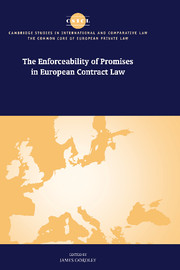Book contents
- Frontmatter
- Contents
- General editors' preface
- List of contributors
- Table of legislation
- List of abbreviations
- 1 Some perennial problems
- 2 Contemporary solutions
- Case 1 promises of gifts
- Case 2 promises of compensation for services rendered without charge
- Case 3 promises to pay debts not legally due
- Case 4 a promise to come to dinner
- Case 5 promises to store goods without charge
- Case 6 promises to do a favour
- Case 7 promises to loan goods without charge
- Case 8 a requirements contract
- Case 9 promises to pay more than was agreed I
- Case 10 promises to pay more than was agreed II
- Case 11 promises to do more than was agreed; promises to waive a condition
- Case 12 promises to take less than was agreed
- Case 13 options given without charge
- Case 14 promises of rewards
- Case 15 promises of commissions
- 3 Comparisons
- Index by country
- Index by subject
Case 8 - a requirements contract
Published online by Cambridge University Press: 18 May 2010
- Frontmatter
- Contents
- General editors' preface
- List of contributors
- Table of legislation
- List of abbreviations
- 1 Some perennial problems
- 2 Contemporary solutions
- Case 1 promises of gifts
- Case 2 promises of compensation for services rendered without charge
- Case 3 promises to pay debts not legally due
- Case 4 a promise to come to dinner
- Case 5 promises to store goods without charge
- Case 6 promises to do a favour
- Case 7 promises to loan goods without charge
- Case 8 a requirements contract
- Case 9 promises to pay more than was agreed I
- Case 10 promises to pay more than was agreed II
- Case 11 promises to do more than was agreed; promises to waive a condition
- Case 12 promises to take less than was agreed
- Case 13 options given without charge
- Case 14 promises of rewards
- Case 15 promises of commissions
- 3 Comparisons
- Index by country
- Index by subject
Summary
Case
Alloy, a steel manufacturer, promised to sell Motor Works, a car manufacturer, as much steel as it ordered during the coming year for a set price per ton. Is the promise binding (a) if the market price rises to 20 per cent more than the contract price, and Motor Works orders the amount of steel it usually needs? (b) if the market price rises to 20 per cent more than the contract price, and Motor Works orders twice the steel it usually needs? (c) if the market price falls to 20 per cent below the contract price, and Motor Works buys no steel from Alloy, buying its requirements of steel on the market instead?
Discussions
FRANCE
The arrangement between Alloy and Motor Works seems to be aimed at fixing the general conditions of sale, which will be the subject of later orders. Under French law, such a contract would be considered a framework contract (contrat cadre) as opposed to the sales contracts (contrats d'application) which implement the initial contract. It is probably more accurate to view the contrat cadre as a convenient and practical category which scholarly opinion (doctrine) has constructed so that it will not be necessary to analyse each sale as a new contract with its own conditions. This construction is more elegant.
The only other possible analysis, in our view, would be to consider the arrangement to be a unilateral promise to sell (promesse unilatérale de vente) since Alloy is already bound to sell at a fixed price while Motor Works may or may not decide to purchase.
- Type
- Chapter
- Information
- The Enforceability of Promises in European Contract Law , pp. 193 - 218Publisher: Cambridge University PressPrint publication year: 2001
- 1
- Cited by

